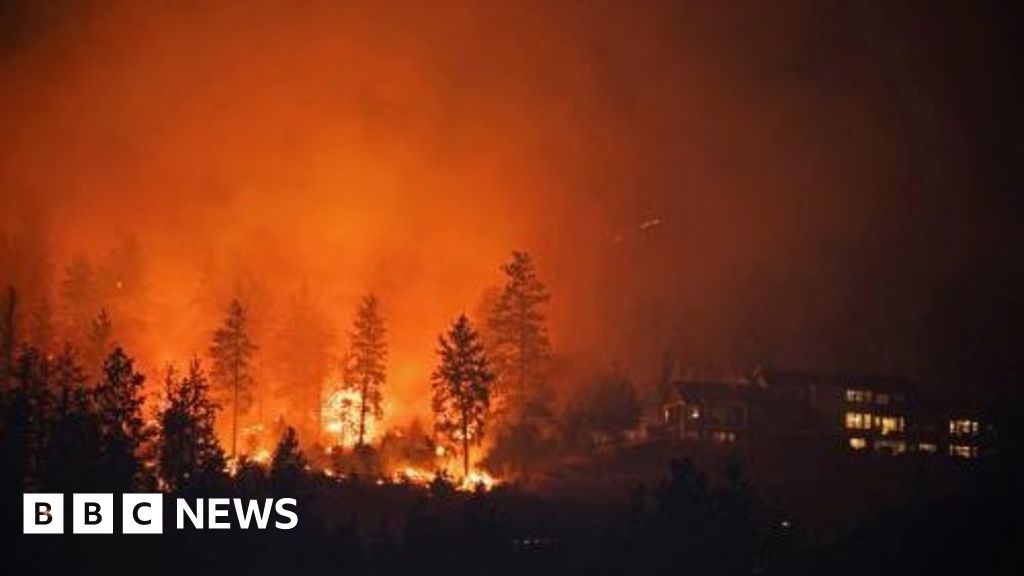This video can not be played
To play this video you need to enable JavaScript in your browser.
Wildfires raging across Canada’s British Columbia have shown some signs of easing, but blazes from hundreds more have driven out more than 30,000 people from their homes.
Officials said firefighters have made some progress aided by cooler weather but the “battle is not over”.
The government is deploying military to help with evacuations in the province.
Smoke blanketing much of Southern British Columbia has also prompted air quality warnings.
Speaking to reporters on Sunday, Kelowna fire chief Travis Whiting said he was “very excited” about the advances his team of 500 or so firefighters have made over the last four days, with the help of cooler and calmer weather. But he cautioned the battle was not over.
“Make no mistake, there will be difficult days ahead,” Mr Whiting said.
As of Sunday afternoon, the fire covered an area of 410 square kilometres (101,300 acres).
British Columbia remains under a state of emergency, and Prime Minister Justin Trudeau said on Sunday that the military will be deployed to the province to help with evacuations.
Officials have also restricted non-essential travel to Kelowna and its surrounding areas – a popular destination for tourists in the summer.
While it is not known yet how many homes and structures have been lost, officials said the damage is “significant,” with both the communities of Scotch Creek and Celista near Shuswap Lake devastated by the wildfire.
The fire department in Scotch Creek was among the buildings that were destroyed.
Homes and properties in West Kelowna have also been scorched, including the historic Lake Okanagan Resort.
A 50-person urban search-and-rescue team, dubbed Canada Task Force 1, has been deployed to Kelowna to help assess the damage, officials said. The team includes fire and rescue personnel, as well as police officers, engineers and doctors.
There have been no fatalities reported in the fires, though many evacuees are waiting to hear if their homes and belongings remain intact.
Honey Williams August told the CBC that she lost her two cats, along with her home and garden near Little Shuswap Lake.
“It’s going to be hard to go back and see a black earth instead of a green earth,” Ms August said.
Smoke blanketing much of southern British Columbia has prompted air quality advisories, with regions like the Eastern Fraser Valley and the Central Okanagan classified as “very high risk” on Monday morning by Environment Canada.
Blazes are also raging in the Northwest Territories with thousands still displaced, though a wildfire threatening the territory’s largest city Yellowknife has stalled at 15 kilometres (9 miles) from the city’s boundary over the weekend.
Last week, fires incinerated the small hamlet of Enterprise in the Northwest Territories.
Wildfires continue to rage across Canada, with 1,037 fires burning as of Monday, according to the Canadian Interagency Forest Fire Centre (CIFFC). Around 650 of those are considered out of control.
Experts say climate change increases the risk of the hot, dry weather that is likely to fuel wildfires.
Extreme and long-lasting heat draws more and more moisture out of the ground – which can provide fuel for fires that can spread at an incredible speed, particularly if winds are strong.
Although no deaths have been reported in the latest fires, at least four firefighters have lost their lives during this wildfire season.
Related Topics
- Wildfires
- Severe weather
- British Columbia
- Canada
